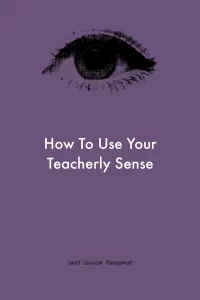
In Malcom Gladwell’s 2003 book Blink, he describes how experts can know what they know but not know why they know it.
They experience a flash of recognition or vision of truth—a blink moment—based on years of past experience and know it to be accurate. As teachers we have these blink moments often.
I call it the teacherly sense.
You teach a lesson and know your students don’t really get it.
A student enters your classroom and you know he’s going to misbehave.
A few students are milling around and you know someone is being bullied.
There are many examples. If given time to think, you may be able to identify specific points of evidence to support your conclusions.
But they’re irrelevant in the moment.
By trusting your teacherly sense, you can act. You can stop what is coming before it arrives. You can alter your lesson, remind the student, or protect the bullied.
However, too many teachers are lost in their own thoughts. An oft-repeated saying here at SCM is that great teachers observe. They’re aware of their surroundings. They have their wet finger in the air.
They position themselves to see, to supervise, to anticipate.
You have this same ability, this teacherly sense. It’s a remarkable advantage. The first step to using it is to be an active observer. When you observe, you’re able to . . .
Consistently follow your classroom management plan.
Better learn your students’ strengths and weaknesses.
Match your lessons to precisely what they need.
Through becoming an astute observer you’ll develop your teacherly sense. You’ll fine-tune it and become reliant on it.
The second step is to pause when it hits you. Blink moments happen immediately. If you ignore them or react without thinking, then they’re of no use.
You must pause first. Ascertain what it’s telling you. Then act. The pause can also allow you to take in more information, like when you notice something strange about the way students are milling around.
You don’t have to know why you know it, but you do have to know what you’re seeing and what it means. This comes naturally through observation. It comes naturally through developed experience.
For example, your students enter the room and you can feel their excitability. It’s a blink moment. You’re sure of it and it portends disruptive behavior. So you pause briefly to take it in.
To hone in using your observational powers.
Then you postpone everything and remind, redo, or guide your class through some calming breaths. Crisis averted. Misbehavior eluded.
Now they’re settled and ready for learning.
If you haven’t done so already, please join us. It’s free! Click here and begin receiving classroom management articles like this one in your email box every week.

Mindfulness of the moment you are in and how the river flows.
Thank you for talking about this! This is one of those things that is so so helpful in classroom management and it’s so hard to articulate and to teach to others. But that sense when a class walks through the door that the kahoot game you had originally planned is not going to work that day, or noticing kids picking on another kid is so powerful and helpful.
Experience is the best teacher. Wisdom grows with age. Teachers need a sixth sense that can come out of all the other five combined when used well — instinct. That’s what gives us a fine tuned teacher’s sense to hear better, see better, plan better, adjust better within just a blink of an eye, then we can get the aha moments that work like magic in our classrooms. Thank you, please.
Great advice.
Being present in the moment is hard for teachers because our brains are constantly thinking about our to-do list. This is a good reminder to be observant at all times.
Thank you for this. I agree with you entirely. Teachers must be present in the moment and be able to read situations by keen observation and not being distracted.
A high level of preparedness is the key to good observation and classroom management. The teacher should not be fumbling around and preparing for the lessons when students enter the class.
I am a much more confident and competent teacher under your tutelage. Thank you.
May I point out a grammatical error? It’s “home” in, not “hone” in. One can hone observational powers but must home in to a particular situation.
Glad to hear it, Julie. As used in the sentence, hone in means to focus attention – which is what I was going for.